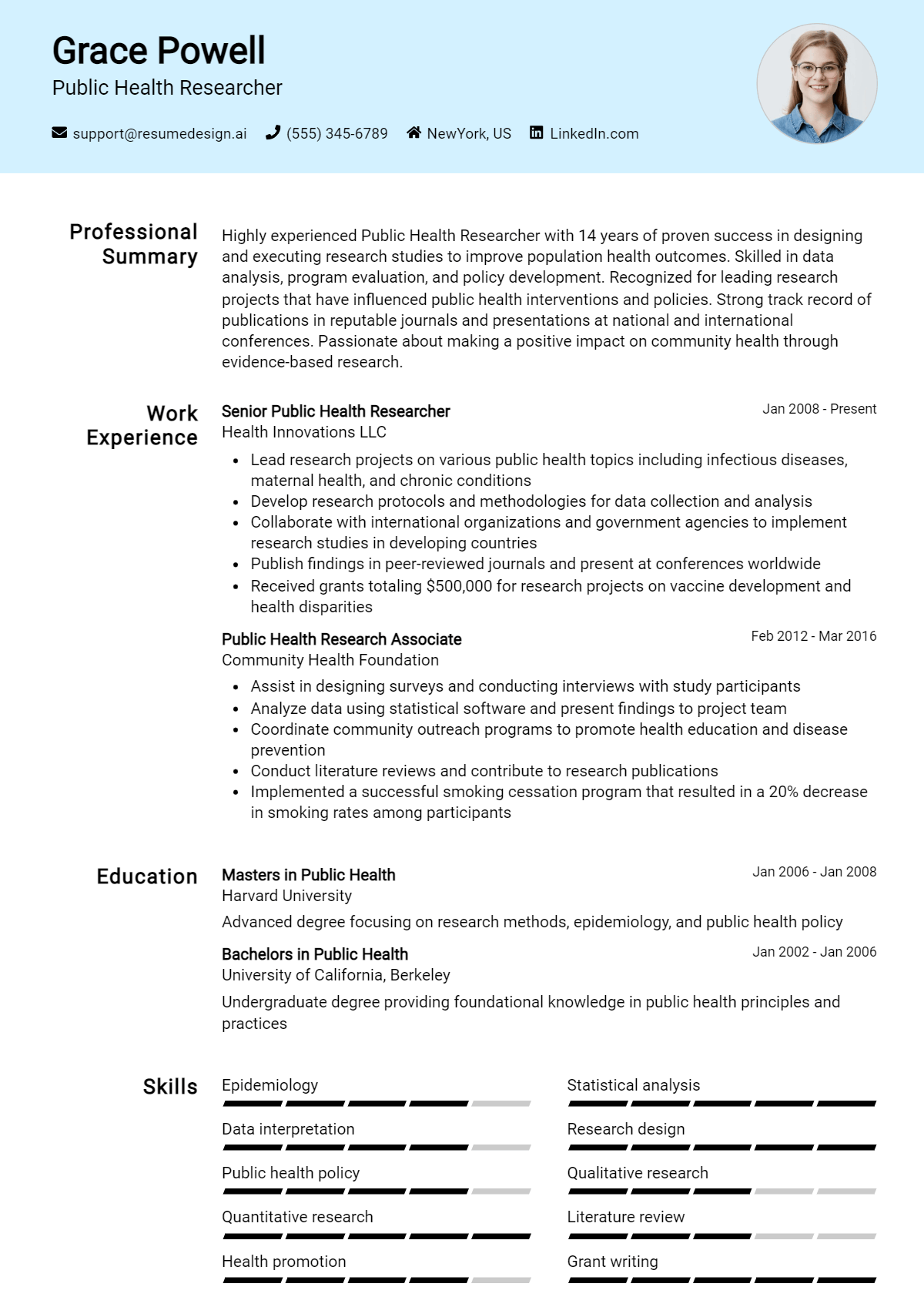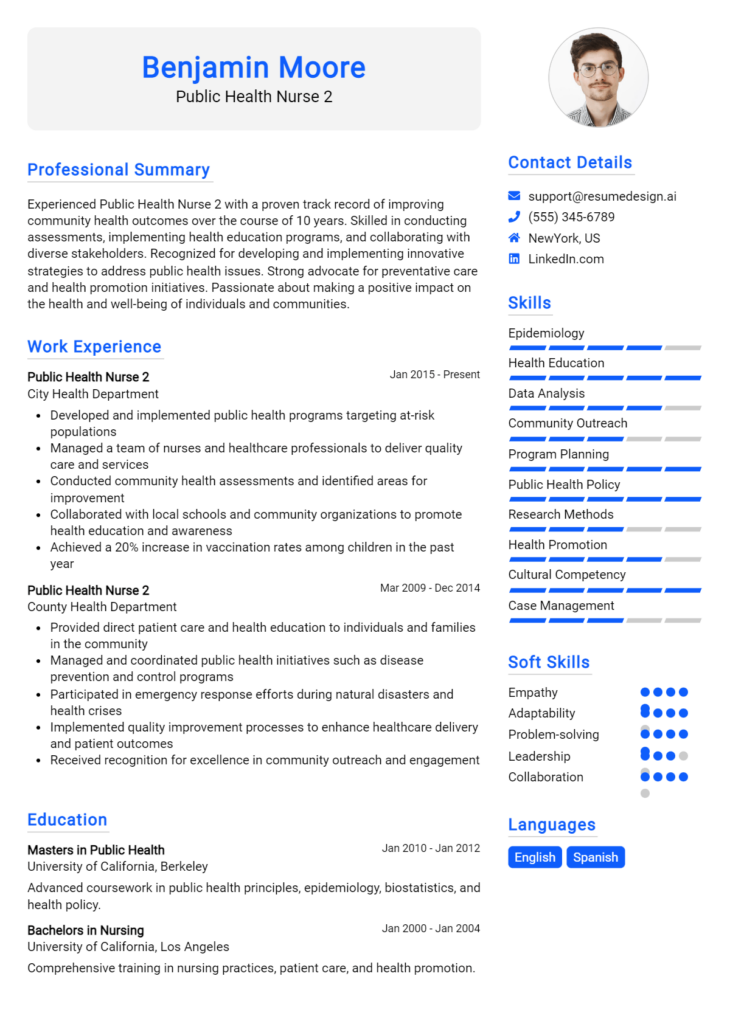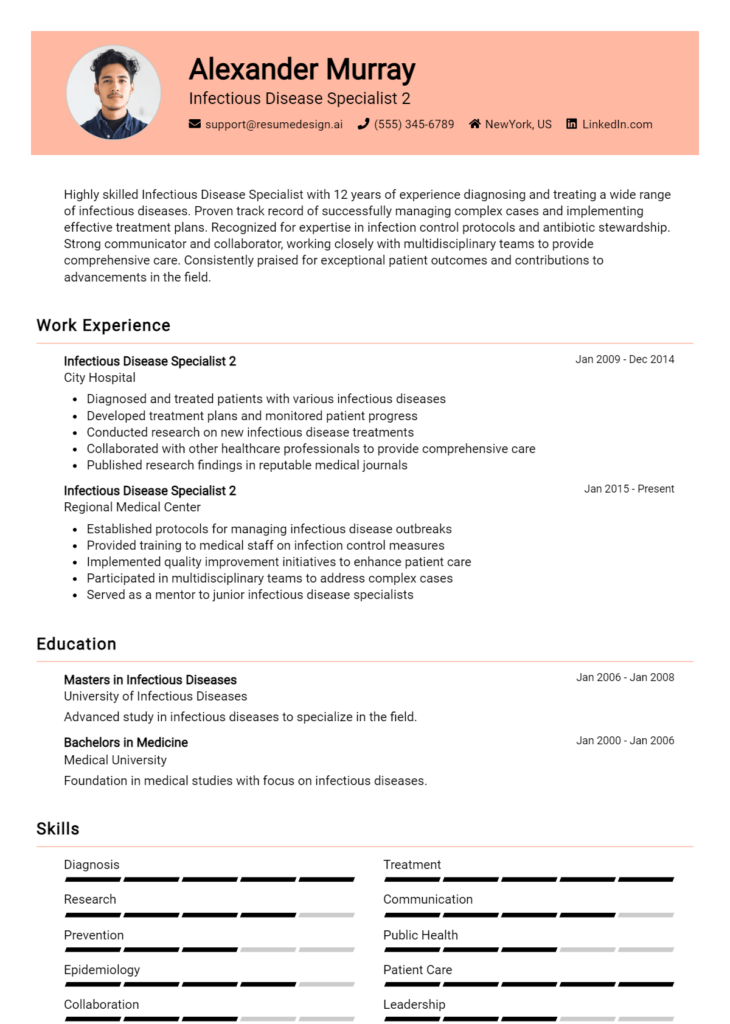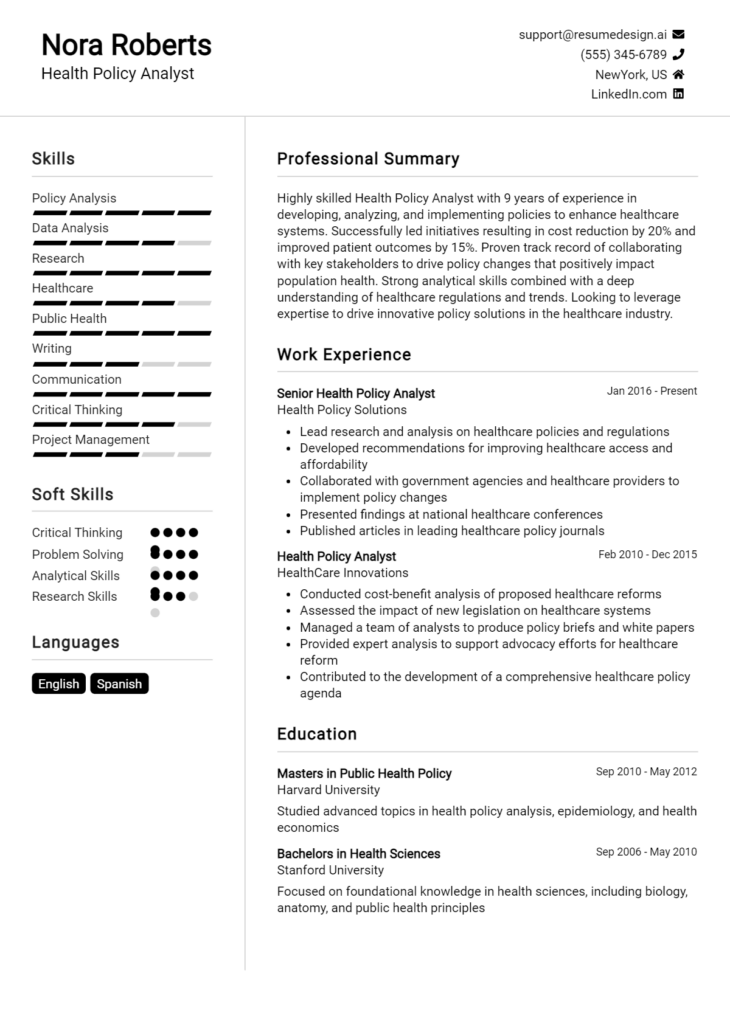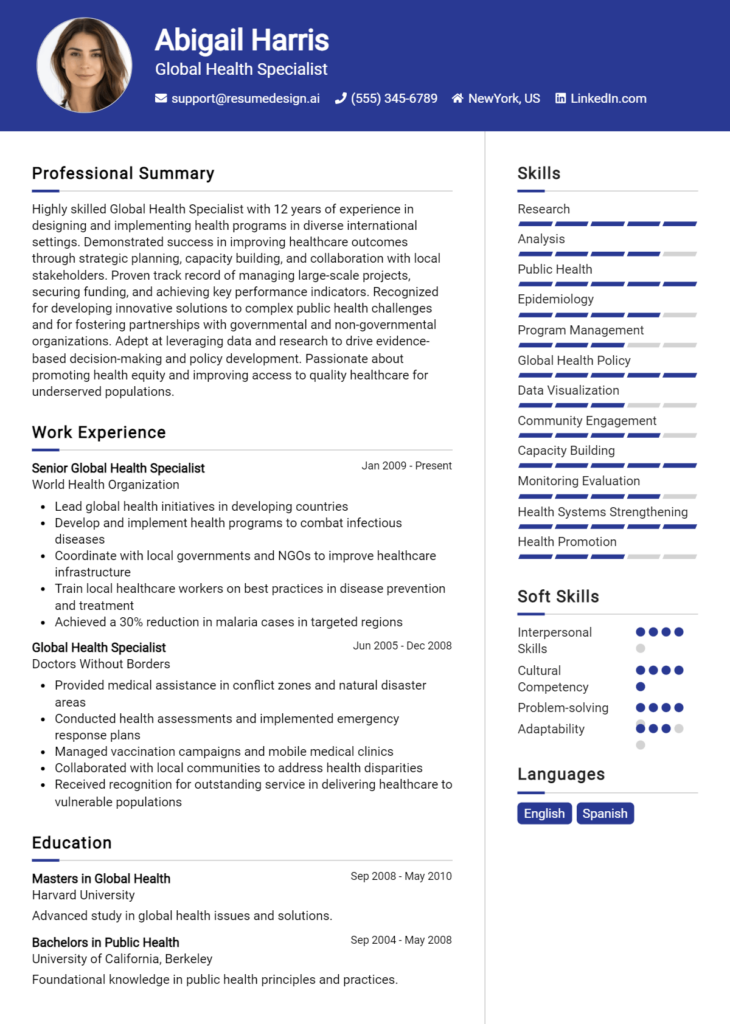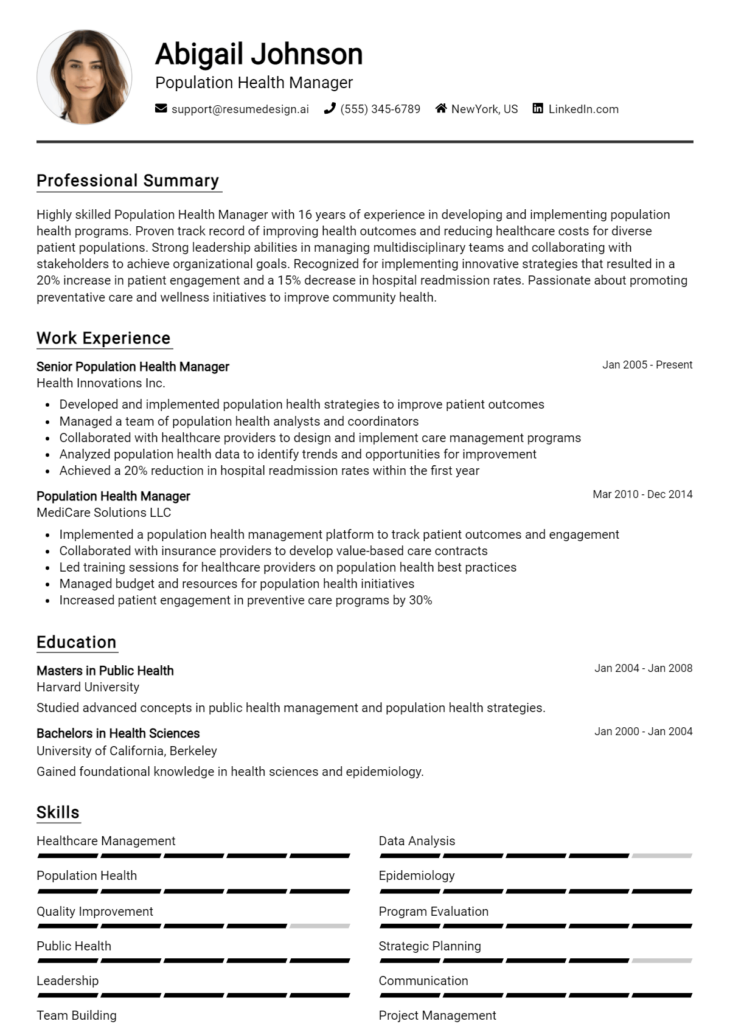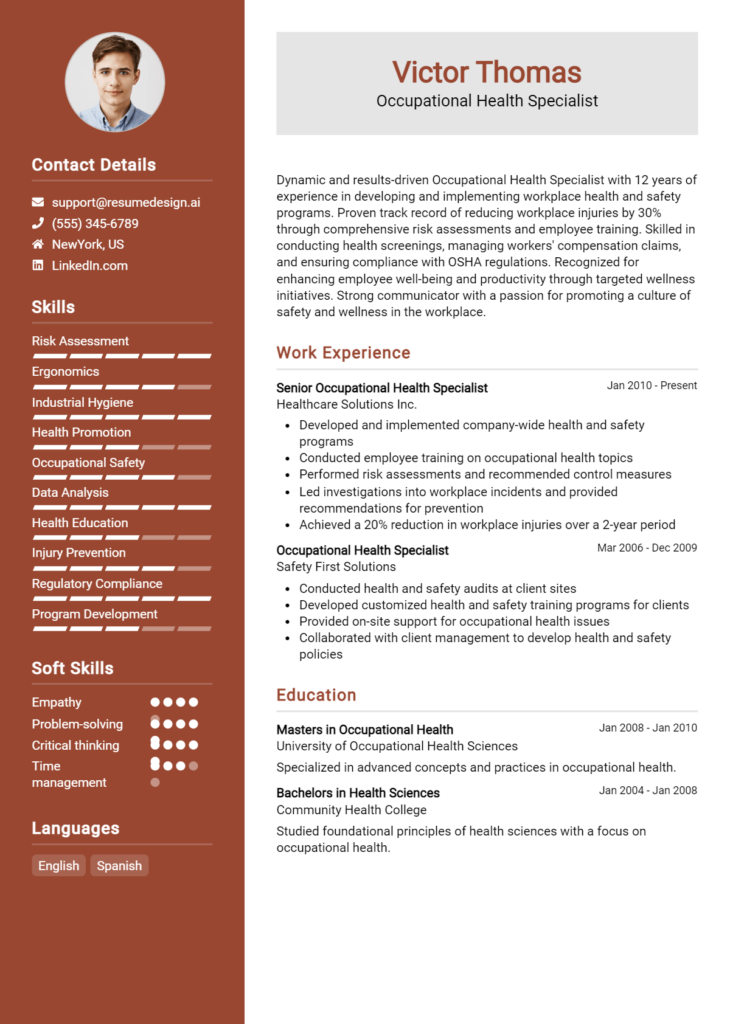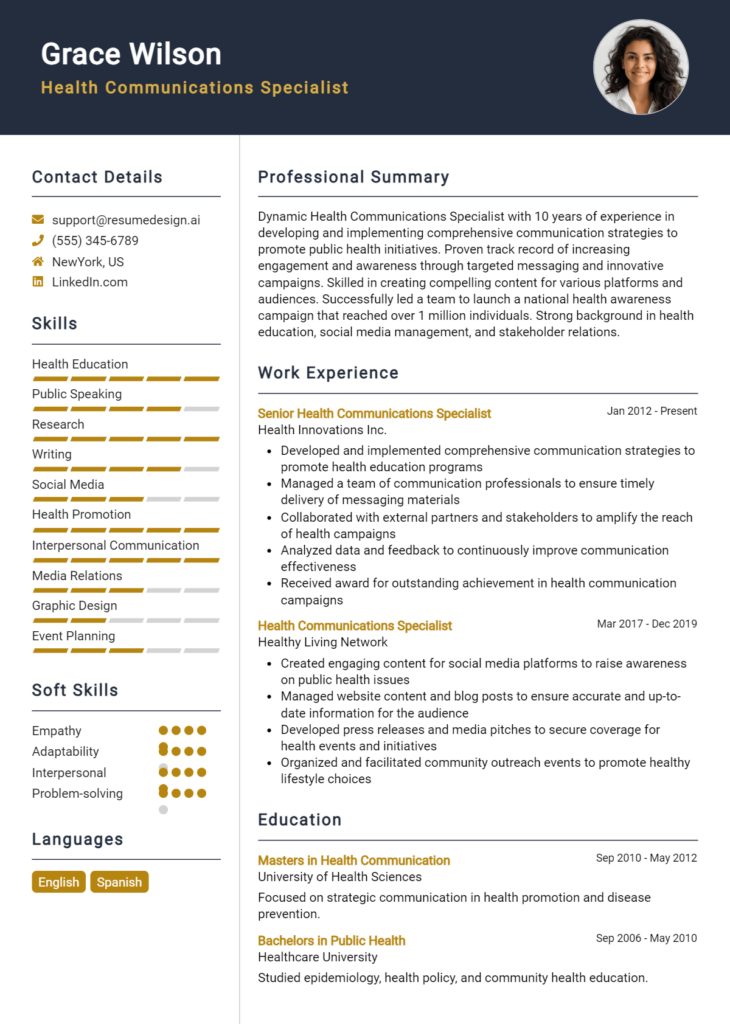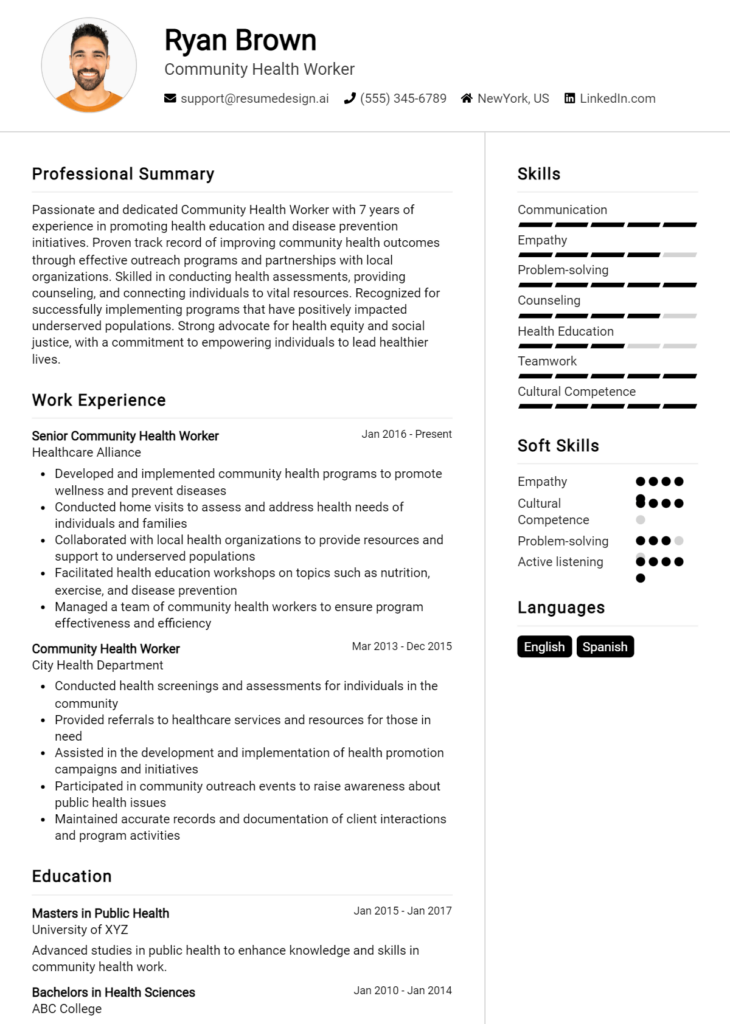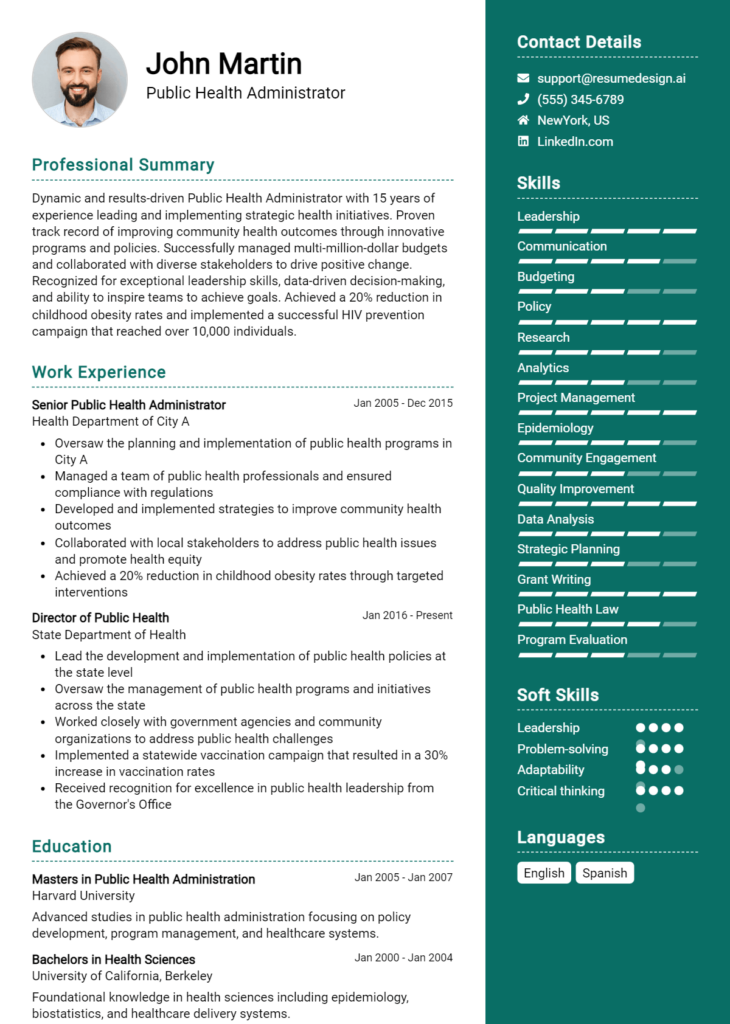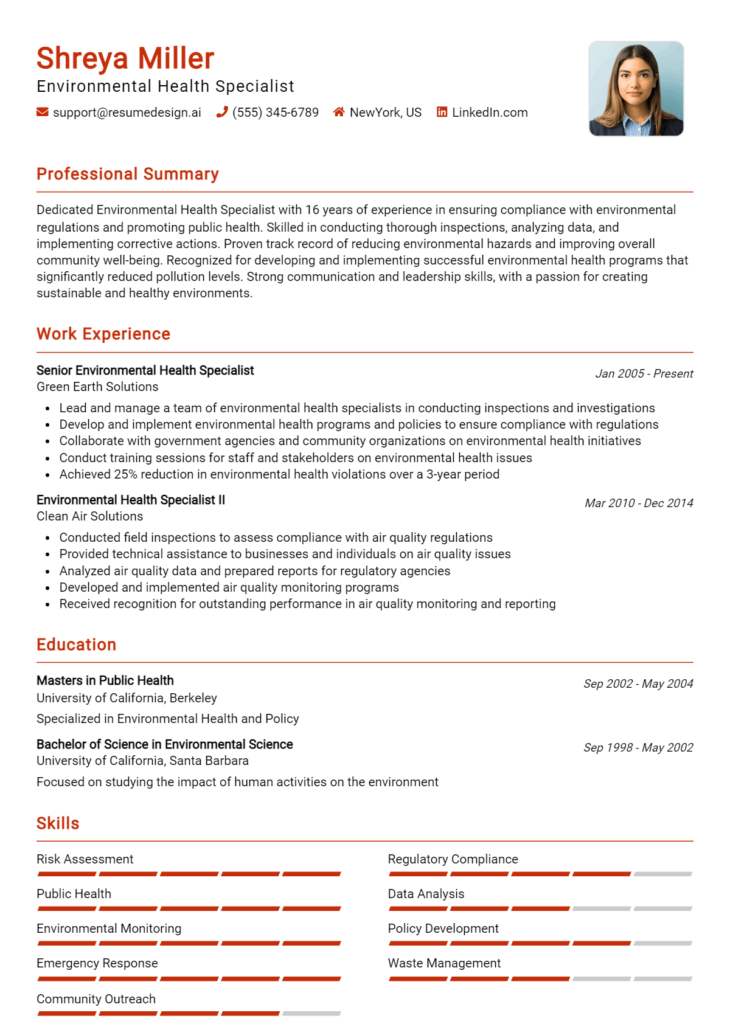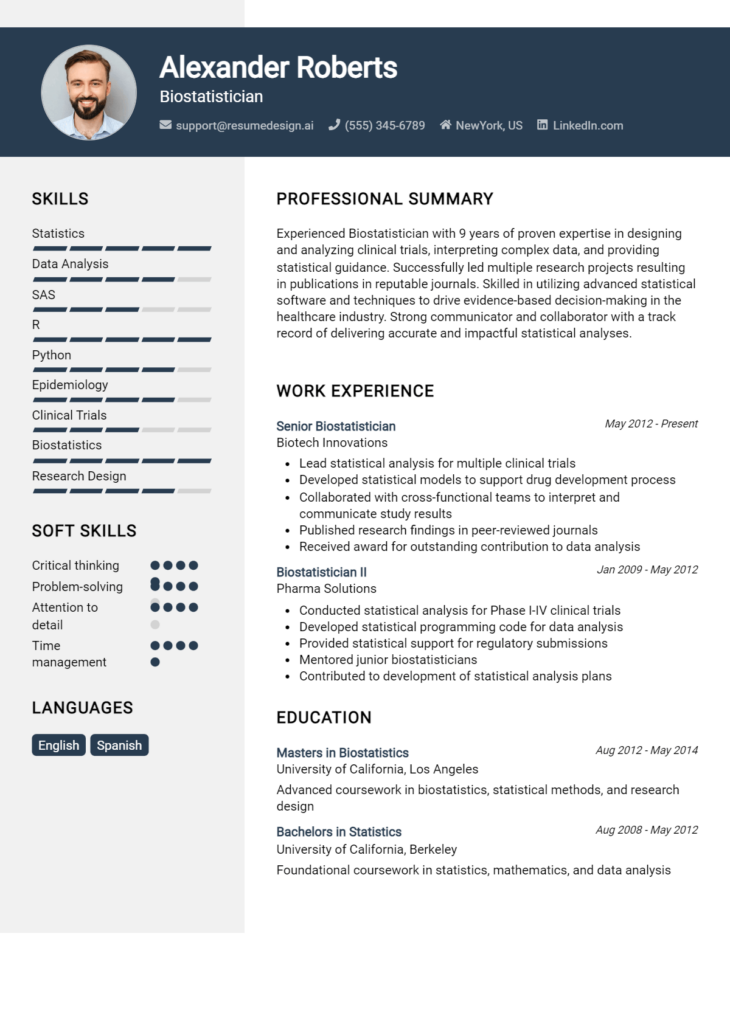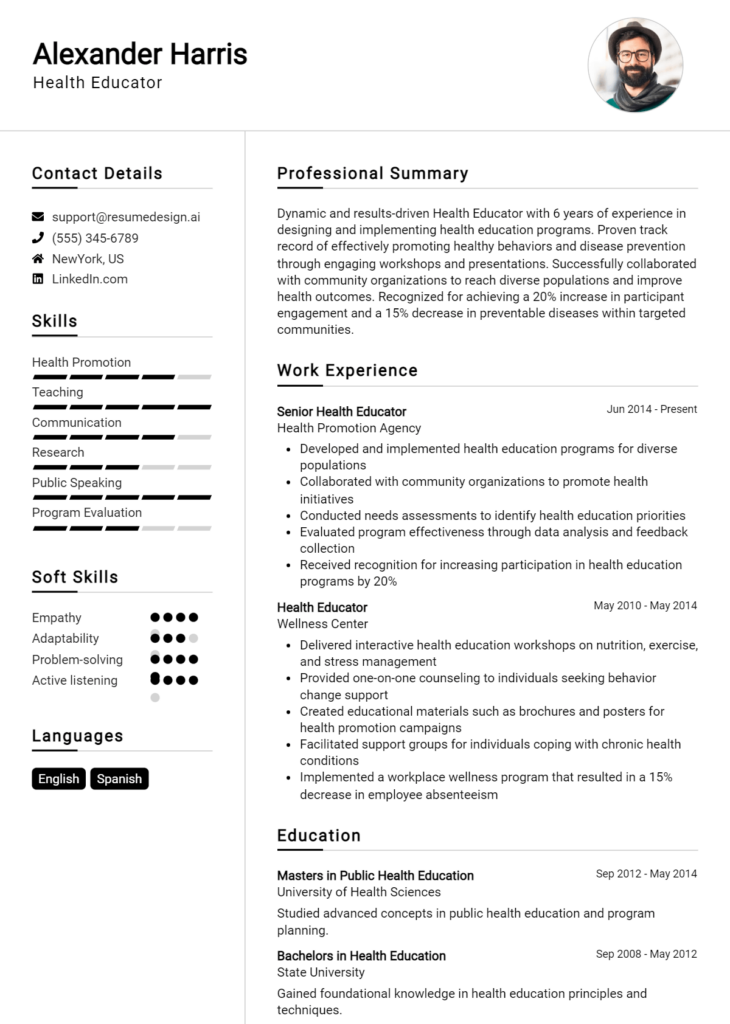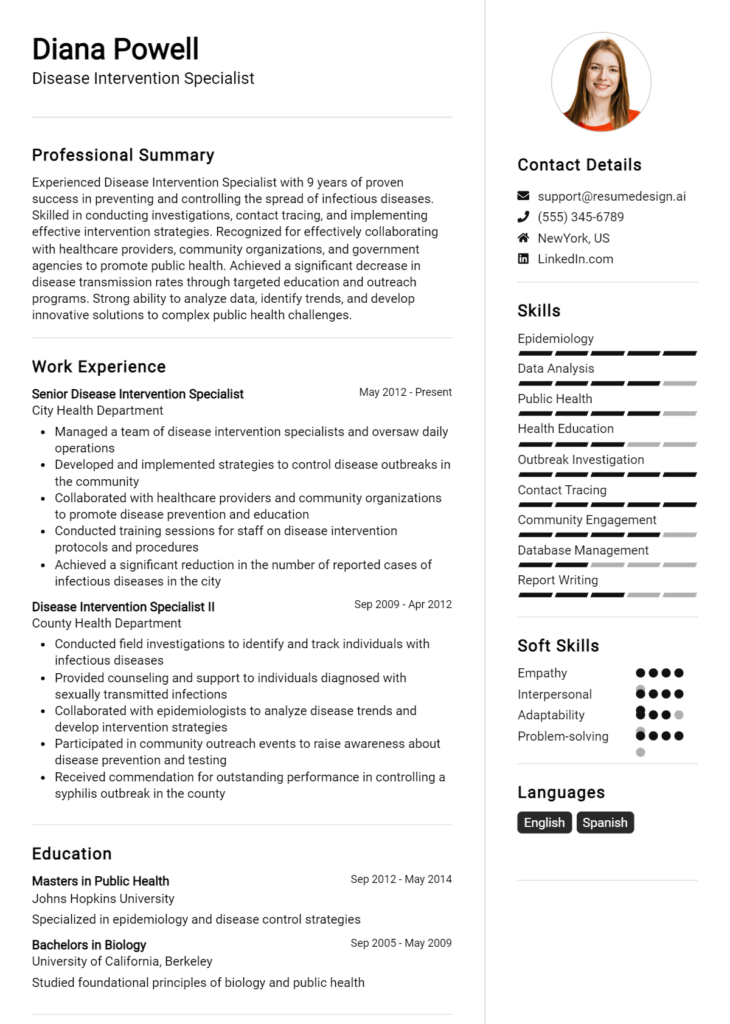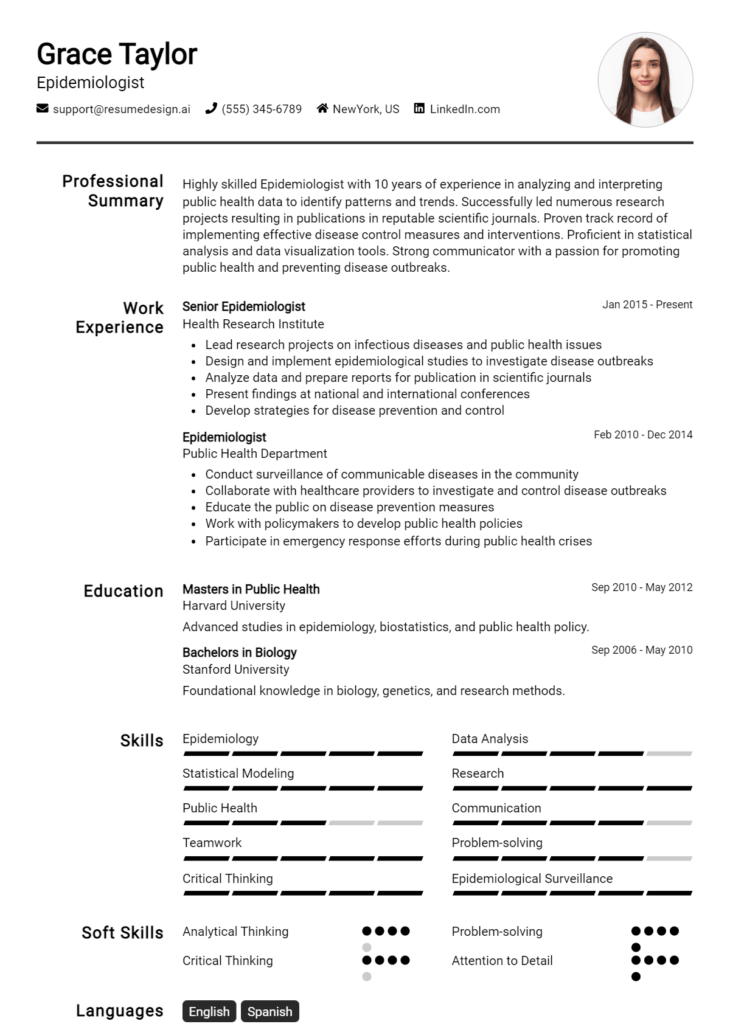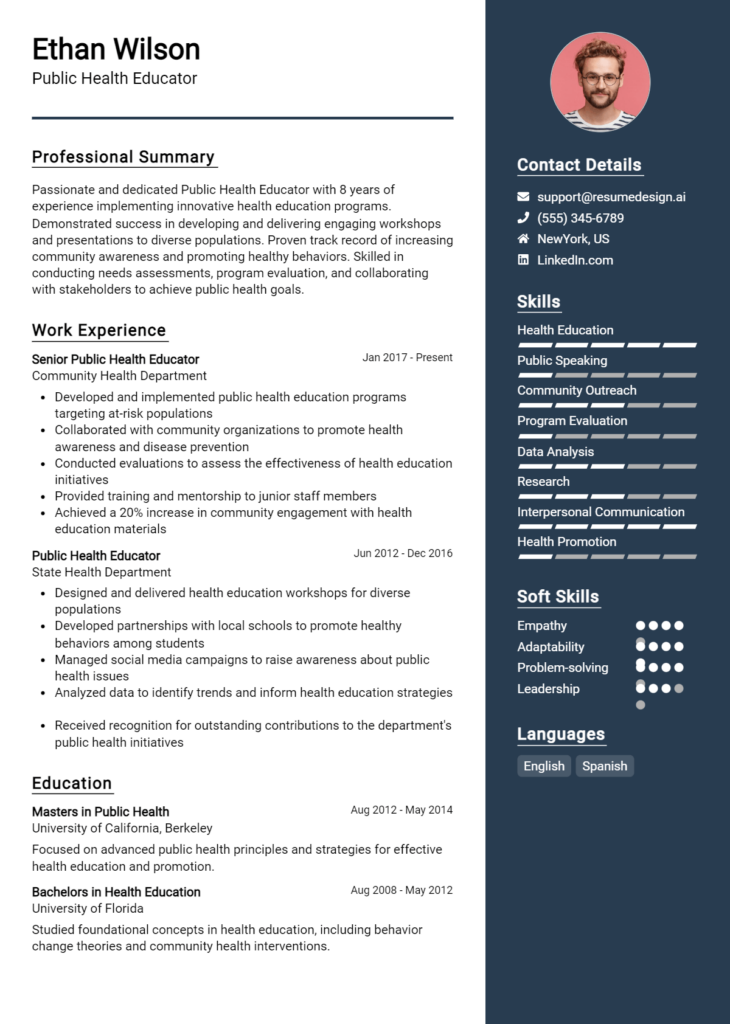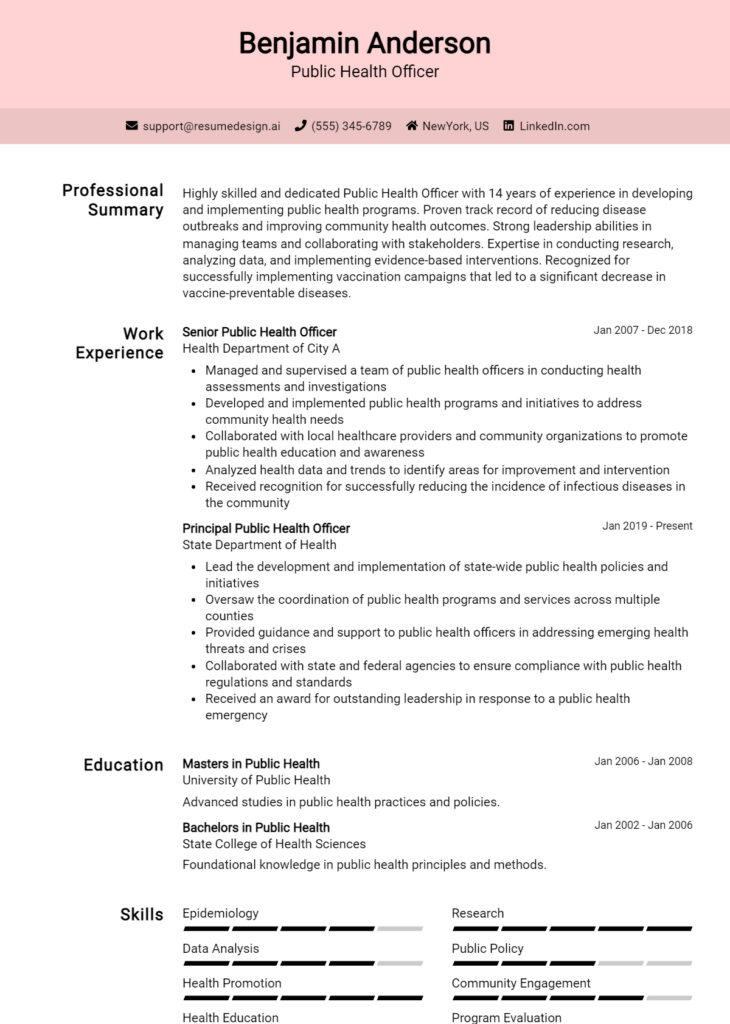Public Health Researcher Core Responsibilities
A Public Health Researcher plays a vital role in analyzing data to inform health policies and practices, bridging the gap between various departments such as epidemiology, biostatistics, and community outreach. Key responsibilities include designing studies, collecting and analyzing data, and disseminating findings. Essential skills include technical proficiency in statistical software, operational planning, and strong problem-solving abilities. These competencies are crucial for achieving the organization's public health objectives, and a well-structured resume can effectively highlight these qualifications for potential employers.
Common Responsibilities Listed on Public Health Researcher Resume
- Designing and implementing public health research studies
- Collecting, analyzing, and interpreting quantitative and qualitative data
- Collaborating with interdisciplinary teams to develop research protocols
- Preparing reports and presentations for stakeholders and policymakers
- Conducting literature reviews to inform study designs
- Monitoring and evaluating public health interventions
- Ensuring compliance with ethical standards and regulations
- Engaging with community organizations and health departments
- Publishing research findings in academic journals
- Utilizing statistical software for data analysis
- Providing training and guidance to junior researchers
- Participating in grant writing and funding applications
High-Level Resume Tips for Public Health Researcher Professionals
In the competitive field of public health research, a well-crafted resume serves as a critical tool for standing out among a pool of candidates. It is often the first impression a potential employer has of you, making it essential to ensure that your resume not only highlights your skills and achievements but also aligns with the specific demands of the role. A strong resume can effectively communicate your expertise in public health, your contributions to research initiatives, and your ability to impact community health positively. This guide will provide practical and actionable resume tips specifically tailored for public health researcher professionals, helping you to present yourself in the best light possible.
Top Resume Tips for Public Health Researcher Professionals
- Tailor your resume to match the job description by including keywords from the posting.
- Highlight relevant experience in public health, research methodologies, and data analysis.
- Quantify your achievements where possible, such as the number of studies completed or the percentage of improved health outcomes.
- Include industry-specific skills, such as proficiency in statistical software or experience with community health assessments.
- Demonstrate your ability to collaborate with interdisciplinary teams and communicate effectively with diverse stakeholders.
- Showcase any relevant certifications or training, such as a Certified Public Health (CPH) credential.
- Use action verbs to begin bullet points, emphasizing your role in projects and initiatives.
- Keep your resume concise, ideally one to two pages, while ensuring it remains comprehensive.
- Include a section for publications or presentations to highlight your contributions to the field.
- Ensure that your contact information is current and professional, including a LinkedIn profile if applicable.
By implementing these tips, you can significantly enhance your chances of landing a job in the public health researcher field. A well-structured resume that effectively showcases your relevant skills and accomplishments will not only capture the attention of hiring managers but also demonstrate your commitment and qualifications for the role. Take the time to refine your resume, and you'll be better positioned to make a lasting impression in this vital area of public health.
Why Resume Headlines & Titles are Important for Public Health Researcher
In the competitive field of public health research, a well-crafted resume headline or title plays a crucial role in capturing the attention of hiring managers. A strong headline serves as a powerful first impression, summarizing a candidate's key qualifications and expertise in a succinct manner. It should resonate with the specific job being applied for, allowing recruiters to quickly assess the relevance of the applicant's experience and skills. By being concise and relevant, a compelling headline not only stands out in a crowded job market but also sets the tone for the rest of the resume, inviting further exploration of the candidate's qualifications.
Best Practices for Crafting Resume Headlines for Public Health Researcher
- Keep it concise: Aim for a headline that is brief and to the point, ideally one sentence or a short phrase.
- Be role-specific: Tailor the headline to reflect the specific position you are applying for, incorporating relevant keywords.
- Highlight key strengths: Focus on your most impressive skills, experiences, or accomplishments that align with the job description.
- Use action-oriented language: Start with strong verbs or adjectives that convey confidence and capability.
- Incorporate metrics: When possible, include quantifiable achievements to provide context to your qualifications.
- Avoid jargon: Use clear and straightforward language that can be easily understood by a hiring manager.
- Make it relevant: Ensure the headline reflects the needs and priorities of the organization or sector you are targeting.
- Revise and refine: Take the time to review and adjust your headline based on the specific job application for maximum impact.
Example Resume Headlines for Public Health Researcher
Strong Resume Headlines
"Data-Driven Public Health Researcher Specializing in Epidemiological Studies and Health Policy Analysis"
“Experienced Public Health Researcher with Proven Track Record in Infectious Disease Control and Prevention Strategies”
“Innovative Public Health Analyst with Expertise in Community Health Assessments and Program Evaluation”
Weak Resume Headlines
“Public Health Researcher Looking for Job”
“Experienced Researcher in Health”
The strong headlines presented are effective because they clearly articulate the candidate's specific expertise and accomplishments, using impactful language that speaks directly to the needs of potential employers. In contrast, the weak headlines fail to impress due to their vagueness and lack of detail, which does not convey the candidate's unique qualifications or differentiate them from other applicants. A strong headline not only attracts attention but also establishes credibility and relevance in the field of public health research.
Writing an Exceptional Public Health Researcher Resume Summary
A well-crafted resume summary is crucial for a Public Health Researcher as it serves as the first impression for hiring managers. This succinct overview encapsulates key skills, relevant experience, and significant accomplishments, enabling the candidate to quickly capture attention amidst a sea of applicants. A strong summary should not only be concise and impactful but also tailored to the specific job for which the candidate is applying, ensuring that it resonates with the priorities and requirements outlined in the job description.
Best Practices for Writing a Public Health Researcher Resume Summary
- Quantify Achievements: Use numbers and statistics to demonstrate the impact of your work.
- Highlight Relevant Skills: Focus on the key skills that align with the job description, such as data analysis, epidemiology, or community outreach.
- Tailor Your Summary: Customize your summary for each position by reflecting the specific requirements and language of the job listing.
- Be Concise: Aim for 3-5 sentences that effectively communicate your qualifications and avoid unnecessary jargon.
- Showcase Experience: Mention any relevant research projects, positions held, or collaborations that illustrate your expertise.
- Include Keywords: Incorporate industry-specific keywords that can help your resume pass through Applicant Tracking Systems (ATS).
- Demonstrate Passion: Convey your commitment to public health and your enthusiasm for the role you are applying for.
- Focus on Outcomes: Emphasize the results of your efforts, such as improved health metrics or successful program implementations.
Example Public Health Researcher Resume Summaries
Strong Resume Summaries
Dynamic Public Health Researcher with over 5 years of experience in epidemiological studies, achieving a 30% increase in community engagement through targeted health initiatives. Proficient in advanced statistical analysis and proficient in using SAS and R for data interpretation.
Results-driven Public Health Researcher specializing in chronic disease prevention, with a proven track record of leading research projects that resulted in a 25% reduction in obesity rates in underserved populations. Skilled in qualitative and quantitative research methodologies.
Detail-oriented Public Health Researcher with expertise in health policy analysis and program evaluation. Successfully collaborated on a national health survey project that informed legislative changes, improving access to healthcare for over 100,000 individuals.
Weak Resume Summaries
Public Health Researcher with some experience in research and data analysis. Interested in making a difference in public health.
Experienced researcher seeking a position in public health. I have worked on various projects and have skills in data collection.
The strong resume summaries are effective because they include specific achievements, quantifiable results, and relevant skills that directly align with the requirements of the Public Health Researcher role. In contrast, the weak summaries lack detail and clarity, failing to highlight any measurable outcomes or specific expertise, making them less compelling to hiring managers.
Work Experience Section for Public Health Researcher Resume
The work experience section of a Public Health Researcher resume is crucial as it serves as a platform for candidates to demonstrate their technical skills, team management capabilities, and the ability to deliver high-quality research outcomes. This section not only highlights relevant experience but also emphasizes the importance of quantifying achievements and aligning them with industry standards. By effectively showcasing prior roles and responsibilities, candidates can illustrate their contributions to public health initiatives and research projects, making a compelling case for their fit within a prospective organization.
Best Practices for Public Health Researcher Work Experience
- Focus on quantifiable results, such as percentage improvements or successful project completions.
- Use industry-specific terminology to demonstrate familiarity with public health concepts and methodologies.
- Highlight collaborative projects and leadership roles to illustrate teamwork and management skills.
- Include relevant technical skills, such as statistical analysis software or research methodologies.
- Tailor experiences to align with the requirements of the job description you are applying for.
- Utilize action verbs to create strong statements that convey impact and initiative.
- Maintain clarity and conciseness to ensure easy readability and engagement.
- Incorporate feedback or results from peers and supervisors to add credibility to your achievements.
Example Work Experiences for Public Health Researcher
Strong Experiences
- Led a team of 5 researchers in a state-wide survey, resulting in a 30% increase in community health program participation.
- Co-authored a peer-reviewed article that presented a novel public health intervention, leading to a 15% reduction in local obesity rates.
- Implemented a data analysis framework that improved the accuracy of health outcome predictions by 25% over previous models.
- Managed a cross-functional team to develop a community health needs assessment, facilitating resource allocation that improved access to care for 10,000+ residents.
Weak Experiences
- Worked on various public health projects with little detail on outcomes or methodologies used.
- Assisted in data collection and analysis without specifying the impact of the work.
- Participated in team meetings and discussions, but did not highlight specific contributions or leadership roles.
- Involved in research projects that were not clearly defined or linked to measurable public health outcomes.
The experiences listed as strong are considered effective because they provide specific examples of leadership, quantifiable achievements, and collaboration, clearly demonstrating the candidate's impact on public health initiatives. In contrast, the weak experiences lack detail and measurable results, making it difficult for potential employers to gauge the applicant's true contributions and capabilities. Strong work experience statements should effectively convey not just what was done, but also the significance of those actions in the context of public health research.
Education and Certifications Section for Public Health Researcher Resume
The education and certifications section in a Public Health Researcher resume is crucial as it serves to highlight the candidate's academic background and showcases their commitment to continuous learning in the ever-evolving field of public health. This section not only delineates the degrees earned but also emphasizes relevant certifications and specialized training that validate the individual's expertise. By including pertinent coursework and certifications, candidates can significantly enhance their credibility and demonstrate their alignment with the specific requirements of the job role, ultimately making a strong case for their qualifications to potential employers.
Best Practices for Public Health Researcher Education and Certifications
- Prioritize relevant degrees such as a Master’s or Doctorate in Public Health or related fields.
- Include industry-recognized certifications, such as Certified Health Education Specialist (CHES) or Certified in Public Health (CPH).
- Highlight specialized training that pertains directly to public health research methodologies.
- Detail relevant coursework that is aligned with the job requirements, particularly advanced statistical analysis or epidemiology.
- Use clear and concise language to describe education and certifications, avoiding jargon.
- Regularly update the section to reflect any new qualifications or additional training completed.
- Organize the section chronologically or by relevance to make it easy for employers to assess qualifications.
- Consider including honors or awards received during academic pursuits to further substantiate qualifications.
Example Education and Certifications for Public Health Researcher
Strong Examples
- Master of Public Health (MPH) - Johns Hopkins University, 2022
- Certified in Public Health (CPH) - National Board of Public Health Examiners, 2023
- Advanced Epidemiology Coursework - University of California, Berkeley
- Certificate in Biostatistics - Harvard University, 2021
Weak Examples
- Bachelor of Arts in English Literature - State University, 2010
- Certification in Graphic Design - Online Course, 2020
- High School Diploma - Local High School, 2005
- Outdated CPR Certification - Expired 2021
The strong examples are considered relevant and robust because they showcase degrees and certifications that are directly aligned with the responsibilities and expectations of a Public Health Researcher. They highlight recent accomplishments and specialized knowledge that enhance the candidate's profile. Conversely, the weak examples reflect qualifications that do not pertain to public health, such as degrees in unrelated fields and expired certifications, which fail to demonstrate the candidate's suitability for the position.
Top Skills & Keywords for Public Health Researcher Resume
As a Public Health Researcher, possessing the right skills is crucial for making impactful contributions to the field. Your resume serves as a key tool to showcase these competencies, helping potential employers understand how your expertise aligns with their needs. A well-crafted resume not only highlights your technical abilities but also reflects your interpersonal skills, both of which are essential for conducting research and collaborating with diverse teams. Emphasizing these skills can significantly enhance your chances of landing an interview and ultimately securing a role that allows you to influence public health policies and practices.
Top Hard & Soft Skills for Public Health Researcher
Soft Skills
- Analytical thinking
- Communication skills
- Team collaboration
- Problem-solving abilities
- Adaptability
- Attention to detail
- Time management
- Critical thinking
- Empathy
- Leadership
Hard Skills
- Statistical analysis
- Research methodology
- Data collection and management
- Knowledge of epidemiology
- Proficiency in statistical software (e.g., SPSS, R)
- Survey design and implementation
- Public health policy analysis
- Geographic Information Systems (GIS)
- Literature review and synthesis
- Knowledge of health systems and services
For more insights on how to effectively highlight your skills and work experience, consider exploring additional resources that can help you create a compelling resume.
Stand Out with a Winning Public Health Researcher Cover Letter
I am writing to express my enthusiasm for the Public Health Researcher position as advertised. With a Master's degree in Public Health and over five years of experience in epidemiological research, I am excited about the opportunity to contribute my skills and knowledge to your esteemed organization. My background in quantitative and qualitative research methodologies, coupled with my commitment to advancing public health initiatives, aligns perfectly with the goals of your team.
In my previous role at XYZ Research Institute, I led a team of researchers in investigating the impact of socio-economic factors on health disparities in urban populations. This project not only honed my analytical skills but also deepened my understanding of the complexities of public health challenges. I employed statistical software such as SPSS and R to analyze large datasets, resulting in actionable insights that informed local health policies. Additionally, I am skilled in collaborating with multidisciplinary teams, facilitating workshops, and effectively communicating research findings to diverse stakeholders, including community members and policymakers.
I am particularly drawn to your organization’s commitment to community engagement and evidence-based interventions. I believe that my experience in designing and implementing community health assessments will allow me to contribute meaningfully to your ongoing projects. Moreover, my ability to adapt research methodologies to meet the unique needs of specific populations ensures that our findings will be relevant and impactful.
I am excited about the possibility of bringing my background in public health research to your team. I am eager to collaborate with like-minded professionals who share my passion for improving health outcomes and addressing health inequities. Thank you for considering my application. I look forward to the opportunity to discuss how my skills and experiences align with the goals of your organization.
Common Mistakes to Avoid in a Public Health Researcher Resume
When crafting a resume for a Public Health Researcher position, it's crucial to present your skills, experience, and qualifications effectively. However, many candidates make common mistakes that can undermine their chances of landing an interview. Avoiding these pitfalls can help you stand out in a competitive job market and showcase your expertise in public health research.
Generic Objective Statements: Using a vague or generic objective can make your resume blend in with others. Tailor your objective to reflect your specific career goals and how they align with the organization's mission.
Neglecting Relevant Experience: Failing to highlight experience directly related to public health research can weaken your application. Be sure to emphasize internships, volunteer work, or projects that showcase your skills in this field.
Overlooking Data Analysis Skills: Public health research often involves data collection and analysis. Neglecting to mention your proficiency with statistical software or data management tools can be a significant oversight.
Excessive Jargon: While it's important to demonstrate your knowledge, using too much technical jargon can alienate non-specialist readers. Aim for a balance that communicates expertise without alienating potential employers.
Poor Formatting and Readability: A cluttered or difficult-to-read resume can detract from your qualifications. Use clear headings, bullet points, and consistent formatting to ensure your information is easily digestible.
Ignoring Soft Skills: Public health research often requires teamwork and communication. Failing to mention your interpersonal skills can give a one-dimensional view of your capabilities.
Listing Responsibilities Instead of Achievements: Simply stating your job duties can come across as passive. Instead, focus on your accomplishments and the impact of your work in previous roles to demonstrate your effectiveness.
Not Tailoring the Resume for Each Job Application: Sending out the same resume for multiple positions can be detrimental. Customize your resume to highlight the most relevant experience and skills for each specific job you apply for.
Conclusion
As a Public Health Researcher, you play a crucial role in understanding health trends, evaluating interventions, and shaping policies that impact community well-being. Throughout your career, you gather and analyze data, design studies, and collaborate with various stakeholders to address pressing health issues. This multifaceted role requires strong analytical skills, attention to detail, and effective communication abilities.
In summary, the key points to focus on in your resume include your research experience, data analysis skills, knowledge of public health principles, and your ability to work collaboratively. Highlight any publications, presentations, or impactful projects that showcase your contributions to the field.
Now is the perfect time to ensure your Public Health Researcher resume reflects your qualifications and achievements accurately. Consider utilizing tools that can help enhance your resume and make it stand out. Check out the resume templates for stylish designs, use the resume builder for a streamlined creation process, and browse resume examples for inspiration. Additionally, don't forget to craft a compelling introduction with the help of our cover letter templates.
Take action today to refine your resume and position yourself as a competitive candidate in the public health research arena!

